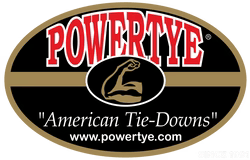Whether you’re hauling motorcycles, ATVs, cars, or equipment, trailer straps are the silent enforcers of safe transport. Often overlooked, yet absolutely critical, these heavy-duty tools are the difference between a smooth journey and a costly disaster. At PowerTye, we understand that true peace of mind begins with gear you can count on. Our trailer straps aren’t just accessories—they’re engineered safety solutions built to perform under pressure.
Why Trailer Straps Matter More Than You Think
When loading valuable cargo onto a trailer, most people focus on vehicle alignment or weight distribution. While those aspects are important, neglecting to secure your load with quality trailer straps can lead to shifting, slippage, or even complete load loss. A simple jolt, hard brake, or sharp turn could turn an unsecured trailer into a serious hazard. That’s why using properly rated, well-maintained trailer straps is a must—not just a recommendation.
Different Types of Trailer Straps and Their Use Cases
Every trailer strap has a specific purpose—what works for one load may fail for another. The ideal trailer strap setup varies based on what you’re hauling, how your trailer is built, and whether you’re traveling through rain, heat, or rough terrain.
1. Ratchet Straps
Known for their mechanical advantage, ratchet straps offer exceptional tensioning power and are perfect for heavier vehicles and gear. PowerTye ratchet straps are equipped with industrial-grade ratchets and thick, abrasion-resistant webbing, ensuring your cargo stays locked in place.
2. Cam Buckle Straps
Cam buckles are best suited for lighter loads or sensitive cargo. These are easier to handle, quicker to install, and apply less compressive force—ideal for items where over-tightening can cause damage.
3. E-Track and L-Track Systems
For enclosed trailers or professional setups, E-Track and L-Track trailer straps allow multiple anchor points and flexible configurations. Customizable tie-down systems can be configured to securely anchor everything from sport bikes to boxed freight, giving you greater control over load safety.
Key Features to Look for in Reliable Trailer Straps
When it comes to choosing trailer straps, not all are built to the same standard. Look for these features to ensure long-term durability and performance:
- Ensure your tie-downs offer a working load limit that comfortably exceeds your cargo’s weight, providing a secure margin for unexpected shifts during transit.
- Weather-Resistant Materials: UV protection and water-resistant coatings are vital for outdoor hauls.
- Reinforced Stitching: Double or triple-stitched joints resist fraying and failure.
- Secure Hooks or Fittings: From S-hooks to flat hooks, ensure they match your anchor points snugly.
PowerTye’s trailer straps are developed with these exact criteria—ensuring you’re not guessing when it comes to safety.
Installation Tips: Securing Your Load Like a Pro
Correctly using trailer straps isn’t just about clipping and tightening. Follow these tips to maximize performance:
- Inspect Before Every Trip: Check for cuts, frays, and rusted hardware.
- Tension Properly: Too loose and your cargo shifts; too tight and you risk damage.
- Prevent strap twisting by keeping them flat against the surface—this ensures balanced tension and reduces stress on anchor points.
- Anchor at Multiple Points: Distribute force to prevent overloading a single point.
At PowerTye, we recommend replacing worn straps regularly and using redundant anchoring methods for added peace of mind.
PowerTye: Built for the Long Haul
PowerTye has spent years perfecting trailer strap solutions that meet the real-world demands of haulers, motorsports enthusiasts, and weekend road warriors alike. Every strap is tested, reinforced, and made to meet the rigors of real-world towing—because safety shouldn’t depend on luck.
Final Thoughts
Investing in premium trailer straps is more than just protecting your cargo—it’s about protecting lives, vehicles, and your reputation. With PowerTye’s industry-leading straps, you’re not just securing your load—you’re securing confidence every mile of the way.
